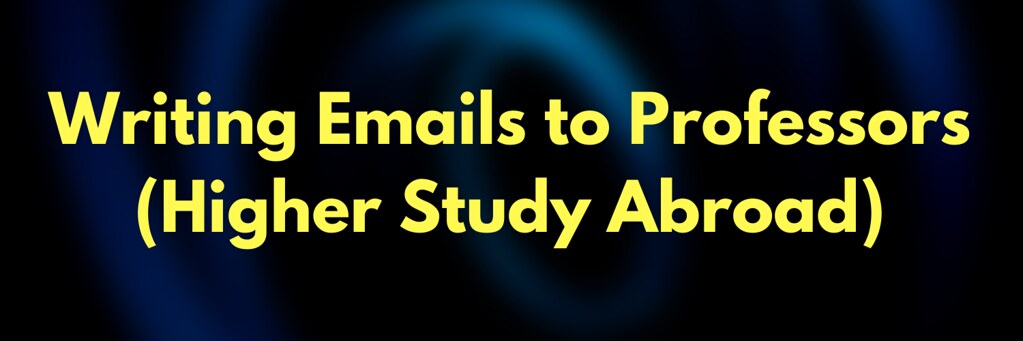Email Template: Writing Emails to Professors (Higher Study Abroad)
Many students who will apply in the following Spring or Fall semester choose their target universities and professors with similar research interests. Getting the opportunity to meet (usually Skype) with a professor enhances the chance of getting admission, especially for STEM students.
However, many students do not know how to approach and write a formal email detailing their interest in working with the professors. Here, I try to provide a simple guideline and example template of a standard email.
Email Template/Format
Email Subject
An example template of the email subject can be as follows:
Prospective student for [your term]: Interested to pursue PHD under your supervision
Just put your target applying term instead of the brackets. For example,
Prospective student for Fall 2022: Interested to pursue PHD under your supervision
Email Body
You can simply start with who you are and what’s your recent experience (recent job) or achievements (highest degree, e.g., Bachelors or Masters). Here is a simple template of introducing yourself in the first paragraph.
Dear Prof. Dr. [Professor’s Name],
Hope you are doing well. I am [your name] and I have been working as a [position, organization (period)]. Earlier, I have appeared in my [recent degree] from [university name (country)] in [major].
For example, I wrote like this when I sent emails to professors.
Hope you are doing well. I am Shanto Roy and I have been working as a Lecturer, Computer Science and Engineering, Green University of Bangladesh (May, 2016 - present). Earlier, I have appeared in my
M.Sc.and completedB.Sc.from Jahangirnagar University (Bangladesh) in Information Technology.
Now, in the second paragraph, you can specify your research interests, the recent projects and publications of the professor you liked most, your own projects that are similar, and recent publications (specially of your thesis/project) if you have. Therefore, an example template might look like as follows:
The primary research topics I find genuine interest in are as follows- [research interests]. After going through your biography and research interest, I have found that my research interests have a strong similarity with yours. I read some of your research works from which [specify particular publication, u can mention more than one] interests me most. The running research work on your lab specify particular project is very interesting to me as well. My [recent degree] thesis was on “specify your thesis topic” and an initial part of the work has been published in [conference/journal name]. I have been involved with some other projects on “ [project names]” as well.
Finally, in the last paragraph, show your interest to work with him in his current projects (be specific if you can). Also, ask him if your credential satisfies his requirements. And thank him for his time reading your email.
I am quite interested to work with you and I want to learn more about your current research projects. Could you please let me know whether you are planning to take any student in [target term (e.g., Fall 2022)] and whether my profile suits with your requirements. I would be grateful if you could spare some times in evaluating my credentials.
Credential Summary
Now, you should provide the summary of your credentials. You can write something as follows:
Postgraduate CGPA: [Write yours] Undergraduate CGPA: [Write yours]
Research & Publications:
- Chapter in Book - [Write yours]
- Conference Proceedings - [Write yours]
- Journal Article - [Write yours]
- Manuscripts Under Review - [Write yours]
Experience: [Write yours] GRE: [Write yours] ( Q- [Write yours], V- [Write yours], AWA- [Write yours] ) TOEFL: [Write yours] ( R- [Write yours], L - [Write yours], S - [Write yours], W - [Write yours] )
N.B. [Mention if you are going to retake GRE/TOEFL].
Ending
I used the following format. You can use similar type of endings.
Sorry for the lengthy email and thanks in advance. I will feel highly privileged if you write me back a few words.
Please find my CV here - Curriculum Vitae Other personal details - shantoroy.me
Thanking you, Shanto Roy
Attachments
Refering to an online CV in your personal site is recommended. Or you can upload your CV on Google drive or any other cloud platform and share it using hyperlink (write the word CV and then add hyperlink 🔗 to it, pasting the whole address is not recommended).
Additional Comments
- Always check typos using grammarly.com or other similar apps.
- Be specific when you talk about the professor’s publications/projects or your own ones
- Use your academic email if you have (e.g., email@institute.edu). Or you can use institutional email (I used my shantoroy@ieee.org account). If you have none, just use an email that has your name on it, not a fancy email account name.
- Use formal words (e.g.,
howeverinstead ofbut,thereforeinstead ofso) and avoid short forms (e.g., writeI willinstead ofI'll) - Always visit the professor’s website for more information
- Always send a follow-up email two weeks later if you have not received a response.
Follow-up Email Example
I sent the following follow-up email (replying to the earlier one) to the professors if I had not received a response of my first email in two weeks.
Dear Professor,
This is a follow-up to my original communication sent on October 16. I fear that I sent the mail at the least convenient time and you were busy at that moment.
I am interested to work you as I found that my research interests have a strong similarity with yours. I would like to have a chance to discuss our shared research interests and ongoing projects at length, perhaps on a Skype session.
Thank you for your time and consideration. Looking forward to hearing from you.
Personal details - shantoroy.me
Sincerely, Shanto Roy
That’s it for today. Cheers!



Leave a comment